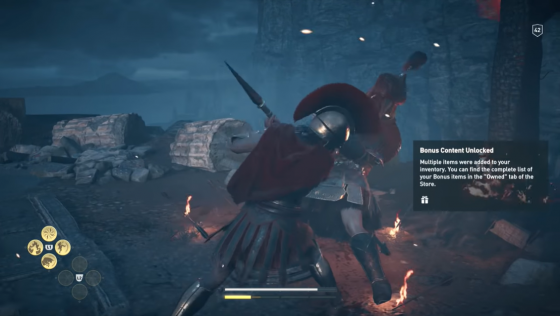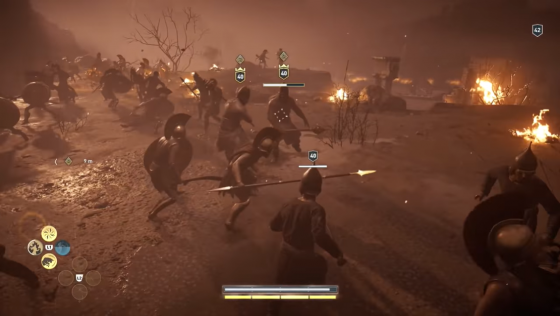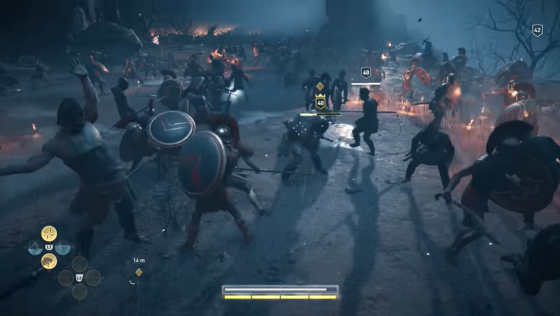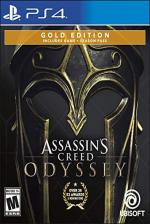This year's Assassin's Creed is here to take players on a sea-faring journey.
Assassin's Creed Odyssey
After a year off, the Assassin's Creed franchise returned in 2017 with the excellent Assassin's Creed: Origins. Origins recast the series as a single-player action role-playing game (RPG), moving away from the pure stealth-action of previous titles, while still retaining the vast open-world and attention to historical detail. It took Assassin's Creed in a new direction, but a question remained: would the next game stick to the style of Origins or return to that of older entries?
Though I expected the series to take another year off, Ubisoft has surprised with Assassin's Creed: Odyssey. This entry leaves behind the deserts, rivers, and marshes of Egypt for the sea-faring islands of Greece. It also moves back even further in the timeline than Origins, finding its setting during the Peloponnesian War and the conflict between Athens and Sparta.
Assassin's Creed: Odyssey is a convergence of some different concepts for the franchise. The core of it is undeniably built upon the same foundation as Origins. If you've played Origins, combat and the general gameplay loop feel largely the same. If you're not heavily into Assassin's Creed, I'd either put some space between playing Origins and Odyssey, or jump straight into the latter game.
The Iliad: On The World of Assassin's Creed Odyssey

Visually, moving to Greece does Odyssey a ton of favors compared its predecessor. Origins looked amazing, whether it was the southern marshlands around Memphis, the deserts surrounding the Great Pyramids of Giza, or the Greek city of Alexandria. Odyssey expands on this by offering a wide variety of islands, each with their own biomes.
The first major city and side of the background conflict, Athens, is nestled in the arid landscape of Attika, while Sparta's shores are lush with wild flowers and greenery, backed up against snow-topped peaks to the west. Malis and Phokis are full of dense forests decked out in the reds and oranges of autumn. You'll run across a red salt lake, tropical island destinations, and dormant volcanoes. Odyssey spreads the visual variety out across its many hours of gameplay, so while you might spend a long time in one place, in 5-10 hours, you'll be somewhere else that looks completely different.
Separating the land-locked areas of Greece and its many islands is a vast ocean. While boat travel was a small part of Origins, it's a major facet of Odyssey. The ship system from Assassin's Creed IV: Black Flag makes a return, allowing the player the ability to run seamlessly onto their ship and sail straight out into open water. Ship-to-ship combat and boarding actions are back, though the Adrestia is far more nimble than Black Flag's Jackdaw. (I didn't know boats could drift.)

You lose the ship-to-land fort engagements of Black Flag, but you gain more options in terms of customizing your ship and your crew. Ship progression allows you to improve the capabilities of the Adrestia with resources like iron and wood, and purely cosmetic options change the overall look of your ship, the masthead, and even the general look of your crew. You'll also be able to choose your lieutenants, who will improve your ship stats, stand on your deck looking cool, and even join you in boarding actions.
Lieutenants can be recruited from nearly every enemy non-player character (NPC) in Odyssey. While you're scanning forts and outposts for enemy positioning you can also see what ship bonuses your opponents bring to the table. If you find one that strikes your fancy, you can knock them out, either from stealth or with the new Spartan Kick ability. Once they're down, you can loot them and then recruit them to your pool of lieutenants. Most of the worthwhile NPCs are named, with their own weapons and looks, so there's a bit of individuality to them. You'll find yourself wanting to collect more unique folks, just so you can see them on the deck of your ship.
The recruiting system is cool, when it works. The problem is all the good recruitables are likely strong enough that the stealth knockout option won't work (more on this in a bit) and the Spartan Kick is touchy. A Spartan Kick only knocks enemies out at the last portion of their lifebar, but at that point they're low enough that anything can kill them. I've kicked a potential recruit, only to have them roll down a hill and die instantly. There are some great candidates you can find on enemy ships, but boarding actions include the rest of your crew, who will likely kill any hopeful outright. Or you'll accidentally kick them into the ocean, where they'll drown. Shadow Of Mordor and Shadow of War offered up a similar system of enemy recruitment, but allowed an actual domination option you could purposefully weave into combat; in Odyssey, you just have to kick and cross your fingers.
Greek Fire: On Combat

Melee and ranged combat have seen an evolution over what was available in Assassin's Creed: Origins. The shield is completely gone and in its place, players have to either dodge or parry. Each option gives a different benefit; the next strike after a parry does 50 percent more damage, while a perfectly-timed dodge slows time. Enemies can switch things up with an unblockable attack, telegraphed by a bright orange glow. These changes make combat more offensive and forceful than the turtling you mostly saw in Origins.
In terms of combat, players are also given more play styles in Odyssey. There are three ability trees: Hunter, Warrior, and Assassin. Hunter is all about dealing damage with the bow and arrow, with the added option to pick up a tamed animal companion. Warrior is straight up melee combat, built for one-on-one and crowd fights. Finally, Assassin leans towards the classic Assassin's Creed play, killing from stealth and misdirecting your foes.
There are some passive abilities in these trees, but most of them are active. Unlike previous entries in the franchise, your character is literally superhuman, a wielder of the First Civilization artifact, The Spear of Leonidas. This construct allows Ubisoft to play fast and loose with new abilities. The Assassin tree has Rush Assassination for example, which literally lets you teleport to your target. Ring of Chaos is an ability in the Warrior tree that creates a shockwave around you, damaging all foes. The Hunter tree has Ghost Arrows as its highest-level ability, which lets you shoot arrows through walls. These supernatural abilities are balanced by the Adrenaline Meter, which fills up as you attack or successfully evade foes. Stronger abilities use more adrenaline, meaning you won't always have your best attacks available.

Ubisoft clearly went back to try and make each play style a viable option. Hunter got a big promotion, with a ton of new abilities allowing you to easily murder foes with a few well-placed arrows. A Warrior build is needed to clean up large groups of enemies, while the Assassin is well-suited to quiet single-shot kills. Weapons and Armour enhance each play style even more, with traits that increase a specific damage type or improve certain abilities.
I admit, the new system allows for more player specialization, but something is lost in the shift towards the RPG playstyle. To balance some of the higher-level abilities in each tree, players not specialized in a specific style are somewhat at a disadvantage. For example, the Predator Shot ability works like Origins' Predator Bow type, dealing massive damage to a single ranged target. Despite this, if you aren't specialized and geared towards Hunter, a Predator Shot won't outright kill an equal level target, or even one a single level below you.
The same is true of assassination, the previous core of the series. At an equal level in Assassin gear, I still found there were occasional targets I couldn't assassinate, only stealth attack for massive damage. Successfully sneaking your way towards a target, only to find out you can't assassinate them-even with the new Critical Assassination ability-is disappointing. Critical Assassination is almost essential to killing many Captain-type enemies from stealth, and there's no version of that ability for non-lethal takedowns if you want to recruit your target. It's a difference I became used to, but I miss being able to stealth takedown a target if I could get to them quietly. It's still possible in Odyssey, but it takes a number of abilities and proper gearing.

Assassin's Creed: Odyssey also has the new Mercenaries feature, which is a retooling of the Phylakes bounty hunter system from Origins. As you commit crimes such as murder or thievery, your level rises on a Grand Theft Auto-style heat meter. At each point in the meter, the game spins up a mercenary, with a unique look, name, and capabilities. These mercenaries are the cops of Odyssey, hunting you down for your transgressions and at maximum Bounty, you'll have a lot of folks aiming for your head.
You can clear your bounty in one of three ways: either you pay the wipe it clean, you kill the person who set the bounty on you, or you hide and wait for the meter to lower. As a deterrent, it largely works, though I think the cost to pay down a bounty is a little too low in the late game where your cash is free-flowing. Mercenaries can be annoying, coming in as a spoiler to a pitched fight if you're not paying attention, but they're also the best way to get some great lieutenants for your ship. The system works just like Shadow Of Mordor, eventually replacing killed or recruited mercs with a new character, so it's always feeding you something interesting.
Given the background of the Peloponnesian War, Assassin's Creed: Odyssey chooses to lean into its history with the new Conquest Battles. As you complete forts and outposts in a region-killing enemy soldiers, burning supplies, and looting-you'll lower the strength of the regional owner, whether that's Athens or Sparta. You can also kill the regional Leader, though they'll be more vulnerable the lower the regional strength is. Once that strength is low enough, you'll unlock a Conquest Battle, large fights against opposing armies. These are wars of attrition, whoever kills faster wins.

Conquest Battles are good ideas on the surface, but after a few tries at the system I didn't use it for most of my playtime. First, who controls a region doesn't really matter. You're not fighting for Sparta or Athens directly and what you face in the region doesn't really change, outside of the Armour of the enemies you're killing. Second, weakening the regional owner doesn't seem to matter much. You'd think it would make the Conquest Battle easier for the attacking side, but no, the attacker always has the Hard version of the fight. It feels like both both sides are always evenly matched and wins come down to the last minute of the fight. Finally, the rewards aren't too much better compared to questing, outside of the lack of travel time. I wanted to like Conquest Battles, but overall they became a system I only engaged with during story battles or on a whim.
The Histories: On The Story
Assassin's Creed: Odyssey finishes the journey that Assassin's Creed: Origins started, shifting the game away from an action game to an open-world action RPG. The player is placed in the sandals of either Alexios or Kassandra; you choose which protagonist is your avatar. Your family was torn apart due to a prophecy that stated the younger sibling (whichever one you don't choose) would be the downfall of Sparta. The leadership, seeking to save itself from such a prophecy, decided to toss the baby off a cliff. You try to save your sibling and get thrown off the cliff too. You escape, growing up on the island of Kephallonia as a misthios, a Greek mercenary.
Odyssey is largely about your journey to bring your family back together. "Family" forms the core of Odyssey's main plot, as your bloodline is connected to the First Civilization that forms the backstory of Assassin's Creed as a whole. While previous Assassin's Creed games are about random assassins who fall into world-ending conflicts, Odyssey literally presents the misthios as the chosen one; shrouded in prophecy and carrying the Spear of Leonidas. It's a more straightforward fantasy story structure.

What Ubisoft has vastly expanded upon are the story choices available to the player. Odyssey now features significant dialog trees, letting players choose how their Alexios or Kassandra respond to situations. Whereas Bayek was his own man who you steered in a direction, the misthios is closer to Mass Effect's Commander Shepard. Sure, bits of the character shine through occasionally-they don't like prophecy all that much-but it's mostly driven by your choices.
Like Mass Effect, Odyssey also offers romances, though in practice, they're less "romance" and more hookup. Odyssey doesn't seem to care which character you are with regard to romance options, as Alexios and Kassandra seem to be treated the same. I literally slept my way across Greece, flirting with everyone and accepting every roll in the hay I could find, regardless of gender.
Odyssey splits its quests out in various levels of importance. There's the Odyssey Quests, which form the main plot. Character and World quests are the next level down, offering some interesting characters and situations. Below that are boilerplate Bounties and Contracts. Bounties send you off to kill a target, while Contracts have you finishing off a variable amount of a certain type of target. (i.e. Sink five Spartan ship.) Odyssey, Character, and World quests tend to get named NPCs and more choices. Bounties and Contracts have you meeting with "Man" or "Soldier" and your only choices are whether you decide to take the contract or not. You can find the latter quest types on Message Boards in each city.

When Assassin's Creed: Odyssey is on point, you can tell that Ubisoft was looking at CD Projekt Red's The Witcher for inspiration. What you do in the quests isn't particularly novel, but the folks you meet are. One lady wants you to collect the ingredients to make a potion to increase her husband's stamina so they can have more sex. Another man has trapped himself in jail at the protests of his parents, because a prophecy said he'd do them harm with his sword and shield. I won't spoil all the ways that one can go, but some are truly weird. On a random island, I saved a hopelessly stupid captain from his crew, who were about to kill him for getting them shipwrecked. The main plot is relayed seriously, but when Odyssey gets weird, it also gets better.
Your major choices shift and move the direction of your story, and actually give me pause in some other choices. Early on, I chose to save a family from priests who put their village to the torch because of a plague. You can guess how that turned out. In the city of Korinth, the misthios has to choose between killing the local crime lord quietly, or in the theatre in front of the whole city. Do you lie in one conversation, or openly boast your presence, knowing the latter option might lead to a man's death? Some choices have regional impact, while others stretch out to encompass the rest of the story. And half the time, Sokrates is there to help you puzzle out the moral weight of your choices.
I wouldn't say the story is far better than Origins, but the weight of your choices lends it more impact overall. When one supporting cast member dies, I wondered if my actions earlier in the game could've saved them; it's entirely possible they always die, but I felt guilty because in my head, there was a reality where I could've saved them. Assassin's Creed: Odyssey even has multiple endings depending on some of the choices made, of which I've only seen a few. It's a good direction for the series, though I wish more of the interesting choices found their way down to some of the more boilerplate quests, because you'll be doing a lot of them.

A lot of folks will wonder: is Assassin's Creed: Odyssey better than Assassin's Creed: Origins? On the whole, Odyssey offers a full RPG experience with cool choices, a wide variety of places to explore, and the return of ship combat to the series. Odyssey is a much bigger game; it took me around 70 hours to complete the main campaign, though you could probably get that down to around 40 if you just blaze through. And the foundation of Odyssey is drawn from Origins, which was an excellent game. Where it falters is in some of the systems it adds to the formula, like Conquest Battles or recruitment; these aren't bad features overall, but they need a little rethinking and polishing to stand up to the rest of the game.
I think at the end of it all, I enjoyed Odyssey more, though. Odyssey and Origins aren't the Assassin's Creeds of old, but they're both a compelling new foundation for the franchise and Odyssey is clearly a step in the right direction. If you're ready for another huge journey, Ubisoft has one ready for you.
Verdict
Building upon the foundation established in Assassin's Creed: Origins, Odyssey brings together that title's RPG adventure with the ship-bound exploration of Black Flag. Choice and consequence feature heavily in Odyssey, with the player guiding Alexios or Kassandra through a massive journey to reunite their family and kill a lot of people. Not every feature is perfect, with things like recruitment and Conquest Battles needing a bit of work, but overall Odyssey is a grand next step for the journey Origins started.


 16th January 2019
16th January 2019












